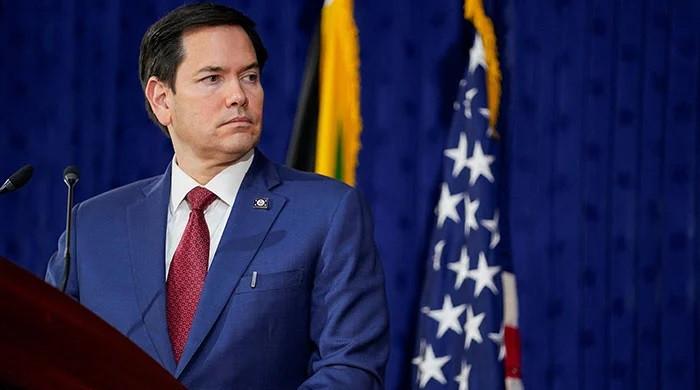 |
| US Secretary of State Marco Rubio looks on as he speaks at an event. — Reuters/File |
U.S. Urges Caution: Recognizing Palestine Could Derail Ceasefire Push
U.S. Secretary of State Marco Rubio warns that recognizing a
Palestinian state now could complicate diplomatic efforts, hinder ceasefire
negotiations, and embolden conflict. Balanced analysis inside.
US Secretary of State Marco Rubio looks on as he
speaks at an event. — Reuters/FileUS Secretary of State Marco Rubio warned on
Thursday that international recognition of a Palestinian state would create
further complications, urging countries to hold back from such a move."We
told all these...
At a diplomatic crossroads, U.S.
Secretary of State Marco Rubio sent a pointed warning from Quito on September
4, 2025: countries rushing to recognize a Palestinian state risk unraveling fragile
peace talks. In blunt terms, Rubio labeled such moves “fake,” arguing they
could create more problems—jeopardizing ceasefire efforts and triggering
reactive backlash. The News InternationalReuters
Rubio’s comments were aimed at nations like France, which is
organizing a UN summit on September 22 where it plans to formally recognize
Palestinian statehood. He suggested that this turn toward recognition could
embolden hardline groups—citing how, when France first announced its
intentions, Hamas walked away from the negotiating table. The News InternationalReuters
With over 147 UN member states already recognizing
Palestine, including major European powers such as Britain, Canada, Australia,
and now France, the diplomatic landscape is shifting. But while recognition
signals solidarity with Palestinian aspirations, its real-world impact remains
symbolic—for now. It doesn't change borders, restore sovereignty, or strengthen
governance. The Palestinian Authority still lacks control over borders, trade,
and diplomatic routes. Recognition, though meaningful, may only reshape how
countries engage rather than bring sweeping change. Reuters
From the U.S. perspective, these symbolic gestures may come
at a cost. Rubio’s warning reflects a broader diplomatic strategy: any move
that could derail a ceasefire—even indirectly—must be considered with extreme
caution. His phrasing, calling recognition “fake,” highlights Washington’s
concern that such actions may provoke unpredictability rather than advance
peace.
For many Western leaders, the humanitarian crisis in Gaza
has reached tipping point. France, Belgium, and others see formal recognition
as a moral imperative—a way to signal outrage and pressure Israel to end
military actions and return to negotiations. Yet, critics say these gestures
may serve optics more than realpolitik.
Voices like former Israeli national security advisor Meir
Ben-Shabbat and political scientist Gayil Talshir argue recognition without
groundwork—a ceasefire, disarmament, PA reform—could make the situation worse.
Talshir cautioned that declarations could “worsen the situation” by jumping the
process rather than building lasting diplomatic infrastructure. ReutersAdelaide NowDaily Telegraph
Indeed, some countries are walking a fine line. Australia,
for instance, is moving ahead with recognition despite pushback and visa
denials for Palestinian Authority President Mahmoud Abbas. Australian Prime
Minister Anthony Albanese secured commitments from the PA—a rejection of Hamas,
demilitarization, and recognition of Israel’s right to exist—before proceeding,
even as Washington raised alarms about undermining negotiations. news.com.au+1
On the diplomatic chessboard, timing is everything. The U.S.
fears undermining negotiations or providing justification for continued
hostilities. The risk is clear: recognition might be leveraged as propaganda to
derail fragile talks or empower spoilers on the ground.
Yet some nations—driven by mounting civilian deaths and
increasing global anger—feel they can’t wait. Belgium recently announced formal
recognition at the UN, pairing it with sanctions targeting Israeli settlements.
Their move reflects growing frustration with stalled peace processes and
tightening daylight between morals and strategy. The Guardian
Meanwhile, on the ground in Gaza and the West Bank,
conditions continue to worsen. Humanitarian devastation and military escalation
have intensified the pressure to act. But recognition in this moment may feel
reactive rather than rooted in peacebuilding. Rubio’s comments are a rebuke:
diplomacy requires patience, coordination, and credibility, not just
headline-driven impulses.
What emerges is a stark contrast between symbolic solidarity
and strategic restraint. The U.S. appears to believe that formal recognition
now could hand a political win to Hamas—who could use it to demand concessions
or collapse negotiations. Meanwhile, a well-sequenced plan—ceasefire,
governance reforms, disarmament, aid—might lay groundwork for eventual
statehood in a more sustainable, dignified way.
The international community now faces delicate choices:
affirm Palestinian rights or risk derailing peace efforts. Recognizing
Palestine may energize public sentiment, but diplomacy still depends on timing,
trust, and real leverage.
Whether this path leads toward lasting peace, or merely
broadened fault lines, remains to be seen. In the meantime, Rubio's message is
clear: recognition without readiness may do more harm than good.
